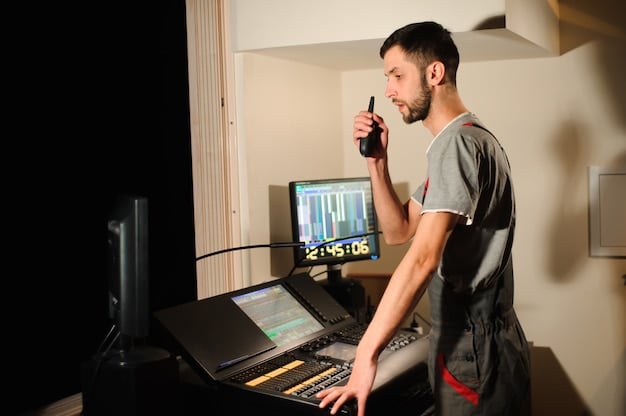Get Radio Airplay: Strategies for Emerging Independent Musicians

Getting radio airplay as an emerging independent musician involves creating high-quality music, understanding the radio landscape, building relationships with radio stations, and leveraging digital tools and strategies to increase visibility and appeal.
For emerging independent musicians, securing radio airplay can feel like an insurmountable challenge. However, with the right strategies and a determined approach, gaining traction on the airwaves is achievable. This article explores how to get radio airplay, focusing on actionable steps for independent artists.
Crafting Radio-Ready Music
The first step in securing radio airplay is to ensure your music is of the highest quality. Radio stations have standards, and your music needs to meet or exceed those standards to even be considered. This involves not only the creative aspects of songwriting but also the technical aspects of recording and production.
Professional Recording and Mixing
Investing in professional recording and mixing is crucial. A well-recorded and mixed track will sound polished and competitive against established artists. This doesn’t necessarily mean you need to spend a fortune, but it does mean finding experienced professionals who understand how to make your music sound its best.
Song Structure and Length
Consider the structure and length of your songs. Radio stations often prefer songs that are between three and four minutes long, with a clear intro, verse, chorus, and bridge. A catchy hook is also essential to grab listeners’ attention.
- Develop a Strong Hook: A memorable hook can make your song instantly recognizable.
- Optimize Song Length: Shorter songs are more likely to get airplay.
- Focus on Quality Production: Professional production can make a huge difference.
Crafting radio-ready music requires attention to detail in both the creative and technical aspects. By focusing on quality recording, effective song structure, and memorable hooks, you increase your chances of getting noticed by radio stations.

Understanding the Radio Landscape
Navigating the radio landscape requires understanding the different types of stations and their specific formats. Not all stations play the same kind of music, and targeting the right stations is essential to getting your music heard.
Identifying Target Radio Stations
Research radio stations that play music similar to yours. Look for stations that support independent artists and have a reputation for breaking new talent. Online directories, music industry publications, and social media groups can be valuable resources for finding these stations.
Types of Radio Stations
There are several types of radio stations to consider, including commercial stations, college stations, community stations, and online radio. Each type has its own unique characteristics and audience.
- Commercial Stations: Reach a broad audience but are often highly competitive.
- College Stations: Support independent music and are open to new sounds.
- Community Stations: Focus on local artists and diverse genres.
Understanding the radio landscape and identifying the right target stations is crucial for maximizing your chances of getting airplay. By researching stations and tailoring your approach to their specific formats, you can increase your visibility and connect with the right audience.
Building Relationships with Radio Stations
Establishing personal connections with radio station staff can significantly improve your chances of getting airplay. Building these relationships takes time and effort, but it can be a valuable investment in your music career.
Networking with Radio Personnel
Attend industry events, music conferences, and local shows to meet radio station personnel. Introduce yourself, share your music, and show genuine interest in what they do. Building a rapport can make them more receptive to your submissions.
Personalized Communication
Avoid sending generic emails. Take the time to research the program director or music director at each station and tailor your communication to their interests and preferences. A personalized email or phone call can make a lasting impression.

Building relationships with radio stations is about more than just sending your music. It’s about creating genuine connections with the people who have the power to share your music with the world. By networking, personalizing your communication, and providing value, you can build strong relationships that lead to airplay opportunities.
Leveraging Digital Tools and Strategies
In today’s digital age, online platforms and tools can play a significant role in getting your music heard on the radio. Utilizing these resources can amplify your reach and increase your chances of gaining airplay.
Online Music Platforms
Make sure your music is available on all major online music platforms, such as Spotify, Apple Music, and Bandcamp. These platforms are often used by radio stations to discover new music.
Social Media Promotion
Use social media to promote your music and engage with your fans. Share updates about your upcoming releases, performances, and radio appearances. A strong social media presence can attract the attention of radio stations.
- Create Engaging Content: Share behind-the-scenes footage, live performances, and interviews.
- Run Targeted Ads: Use social media advertising to reach specific demographics and music fans.
- Engage with Your Audience: Respond to comments, messages, and feedback from your fans.
Leveraging digital tools and strategies can significantly enhance your visibility and increase your chances of getting radio airplay. By utilizing online music platforms, social media promotion, and digital PR, you can reach a wider audience and attract the attention of radio stations.
Submitting Music Professionally
How you submit your music to radio stations can make a big difference. A well-prepared submission package shows that you are serious about your music and respect their time.
Creating a Press Kit
A press kit should include your bio, high-resolution photos, music samples, press clippings, and contact information. Make sure it is professionally designed and easy to navigate.
Following Submission Guidelines
Each radio station has its own submission guidelines. Follow these guidelines carefully to ensure your music is properly considered. Failing to adhere to their rules can result in your submission being ignored.
Submitting music professionally involves creating a well-crafted press kit, following submission guidelines, and understanding the importance of timing. By presenting yourself as a professional and respecting the station’s process, you increase your chances of getting your music heard.
Understanding Music Licensing and Royalties
Navigating the complexities of music licensing and royalties is crucial for independent musicians aiming for radio airplay. Understanding these aspects ensures you receive proper compensation for your work and comply with legal requirements.
Public Performance Rights Organizations (PROs)
PROs like ASCAP, BMI, and SESAC collect performance royalties for songwriters and publishers when their music is played on the radio. Registering with a PRO is essential for receiving these royalties.
Mechanical and Synchronization Rights
Mechanical rights cover the reproduction of your music, while synchronization rights cover its use in film, TV, and other visual media. Understanding these rights can open up additional revenue streams and opportunities.
- Register Your Music: Ensure your songs are registered with a PRO to collect performance royalties.
- Understand Licensing Agreements: Carefully review any licensing agreements before signing.
- Track Your Airplay: Monitor where your music is played to ensure proper royalty collection.
Understanding music licensing and royalties is a vital part of being an independent musician. By registering with a PRO, understanding different types of rights, and tracking your airplay, you can protect your work and ensure you receive proper compensation.
Measuring and Adapting Your Strategy
Once you’ve started submitting your music and getting airplay, it’s important to track your progress and adapt your strategy as needed. Measuring your efforts can help you identify what’s working and what needs improvement.
Tracking Airplay and Listener Response
Use tools like radio airplay monitoring services to track where your music is being played. Also, monitor social media and other online platforms to gauge listener response to your music.
Adapting Your Approach
Based on the data you collect, be willing to adapt your approach. If certain strategies aren’t working, try something new. The music industry is constantly evolving, and staying flexible is key.
Measuring and adapting your strategy is an ongoing process. By tracking your airplay, monitoring listener response, and staying flexible, you can refine your approach and maximize your chances of long-term success.
| Key Point | Brief Description |
|---|---|
| 🎵 Quality Music | Record and mix your music professionally. |
| 📻 Radio Research | Identify stations that fit your music genre. |
| 🤝 Relationships | Network with radio personnel at events. |
| 🌐 Digital Promotion | Use social media and online platforms to promote your music. |
Frequently Asked Questions
▼
The quality of your recording is extremely important. Radio stations have specific standards, and a professional recording showcases your commitment to excellence. Investing in professional mixing and mastering is recommended.
▼
Start by targeting college and community radio stations. These stations are often more open to playing independent music and supporting emerging artists. Once you gain traction, you can approach commercial stations.
▼
Attend music industry events, concerts, and conferences where you can meet radio station staff. Introduce yourself, share your music, and follow up with a personalized email. Building a genuine connection can make a big difference.
▼
Your submission package should include a professionally designed press kit with your bio, high-resolution photos, music samples, press clippings, and contact information. Always follow the station’s specific submission guidelines.
▼
Understanding music licensing ensures you receive proper royalties when your music is played on the radio. Register with a PRO like ASCAP or BMI to collect performance royalties and protect your rights as a musician.
Conclusion
Securing radio airplay as an emerging independent musician requires a combination of high-quality music, strategic networking, and effective digital promotion. By focusing on these key areas and adapting your approach as needed, you can increase your visibility and achieve your goals.





